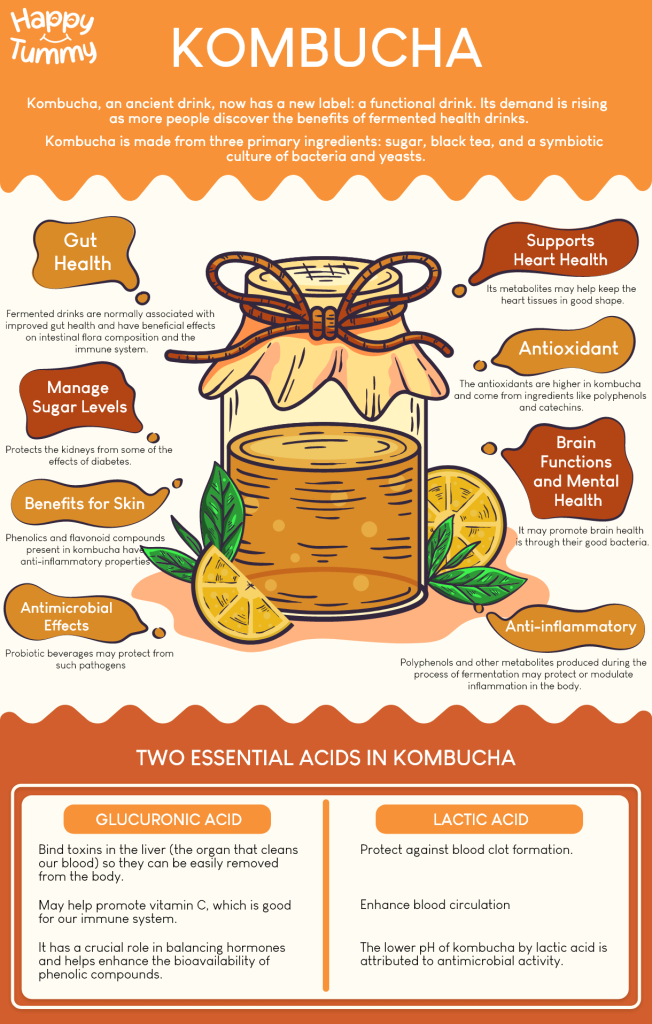Table of Contents
The term “Kombucha” derives from the Japanese words kombu (seaweed) and cha (tea). It is also popularly known as Chainii grib, Chainii kvass, Champignon de, Ling zhi, and Red tea fungus [1].
Kombucha, an ancient drink, now has a new label: a functional drink. Its demand is rising as more people discover the benefits of fermented health drinks.
It can be easily described as fermented tea. Here are some key points to help you understand it better [2] [3]:
- Kombucha is made from three primary ingredients: sugar, black tea, and a symbiotic culture of bacteria and yeasts.
- For most recipes, people prefer using black tea; however, green tea, oolong tea or other types of tea can also be used with added sugar as a substrate for fermentation.
- Sugar is used in the traditional recipe, but other sweeteners may be used too.
- It is available in many refreshing flavours, such as mango, watermelon, lime, and blueberry, blended with herbs and botanicals.
- In most cases, the fermentation lasts for about a week to two weeks.
- The longer it ferments, it helps to increase the amount of bioactive compounds, including polyphenols, B vitamins, Vitamin C, and minerals like copper, iron, manganese, zinc, and nickel [4].
Benefits of Drinking Kombucha

In recent years, kombucha has been referred to as a health drink. It’s often seen as a healthier choice and one of the best-fermented drinks owing to its numerous health benefits.
In the following section, let us understand these benefits with reasons.
1. Gut Health [5]
Kombucha contains healthy bacteria known as probiotics. These bacteria are good for our stomach, assisting digestion and even managing bloating.
The low pH of kombucha, mainly due to the production of high-concentration of acetic acid, has been shown to prevent the growth of pathogenic bacteria. Short-chain fatty Acids, which are found as a metabolite from the fermentation process of kombucha, are reported to demonstrate anti-infammatory, hypoglycemic effects, and in regulation and balance of the intestinal microbiota.
Modulating the intestinal microbiota can improve health by strengthening the intestinal immune response.
Fermented drinks are normally associated with improved gut health and have beneficial effects on intestinal flora composition and the immune system.
When it comes to gut health, what matters the most is how your digestive system works. Thus, the Aashirvaad Digestive Quotient Test is a simple way to find out your digestive score and incorporate improvements to feel your best.
2. Brain Functions and Mental Health
- A healthy brain assists the body’s organs in functioning correctly, enhances our ability to think clearly, and makes us feel good.
- One way fermented tea or probiotic drinks may promote brain health is through their good bacteria. There’s a special connection called the gut-brain axis, which means what happens in our gut may affect how our brain feels and works [6].
- They may also have a role in promoting central nervous system function, as fermented foods have beneficial effect on human cognition [7].
- Likewise, mental health is more of how one feels psychologically. Some studies suggest that drinking kombucha may help enhance our mood. [8]
3. Supports Heart Health [9]
Another benefit of the fermented drink is that its metabolites may help keep the heart tissues in good shape and provide the protective cardiac effect.
The antioxidants present in Kombucha, may also protect against conditions such as maintaining blood vessels and regulating blood pressure levels [10].
Kombucha’s phenolic content has an antihyperlipidemic effect, which may help decrease cholesterol levels in the bloodstream, specifically Low Density Lipoproteins known as LDL and may prevent atherosclerosis. In this way, by supporting your cardiac system, fermented tea might contribute to overall well-being.[28]
In relation to diet management, whole grains may benefit heart health [11].
Further, it can be quite challenging for a person to decide which of the available foods should be consumed for the best quality and nutrition. Aashirvaad Shudh Chakki Atta is produced from whole wheat grains, which nourishes and sustains both body and soul.
4. Antimicrobial Effects [12]
- The term ‘antimicrobials’ means substances that may inhibit the growth of harmful microorganisms.
- Probiotic beverages may protect from such pathogens, and this ability comes from several components that might contribute to its antimicrobial effects.
- They include polyphenols (natural compounds found in tea with antioxidant properties), organic acids, and other beneficial compounds released during fermentation.
- It might also be even more effective at inhibiting the growth of pathological microorganisms if combined with other herbs, like lemon balm.
5. Antioxidant Properties
- Probiotic drinks like fermented tea contain antioxidants that may help shield our systems against diverse health ailments, support immunity, and ease discomfort associated with inflammation [13].
- The antioxidants are higher in kombucha and come from ingredients like polyphenols and catechins [14].
- The level of antioxidants present depends on the type of tea used and its fermentation period.
- For example, green tea kombucha has stronger antioxidant properties, and fermentation enhances these more [15].
6. Kombucha & Anti-inflammatory Properties [16]
Inflammation consequently refers to the mechanisms that the body relies on with the aim of protecting itself from infections and injuries.
However, when inflammation is prolonged (chronic), it may result in various health conditions.
How may kombucha help with this?
Polyphenols and other metabolites produced during the process of fermentation may protect or modulate inflammation in the body.
7. Manage Sugar Levels [17]
Closely monitoring sugar levels is very crucial because it may help one with diabetes and general health status.
8. Kombucha Benefits for Skin [18]
Phenolics and flavonoid compounds present in kombucha have anti-inflammatory properties that are known to manage skin inflammation, free radicals, and UV ray penetration, and promote skin regeneration.
It also has a low acidity level which perhaps may hinder bacterial access to the skin.
Plus, it might encourage new skin cells to grow, which is necessary for keeping skin healthy, replenished, and smooth.
Inflammation may lead to structural and functional changes that impact skin health [19] [20]. There could be multiple reasons for this, such as stress, any health condition, a nutritionally deficient diet, or even unhealthy eating habits.
However, lifestyle behaviors such as regular exercise, restful sleep, and a balanced diet along with the inclusion of such functional foods with positive health benefits may have a positive role in promoting and maintaining healthy skin [21].
Sometimes, it can be overwhelming to decide what to eat or how specific foods may affect your health.
This is why you should consult a nutritionist. They can guide you on which foods to prioritise and how to incorporate them into your daily meals. It will help you achieve not just healthy skin but overall wellness. Remember, when your internal health is at an optimal state, it is reflected in your skin, and you feel your best.
Other Benefits of Kombucha [22]
- Probiotics produced during the fermentation process may boost immunity. [23].
- It may promote liver health by keeping important markers in check through its hepatoprotective capacity [24].
- Some acids present in kombucha tea might aid the body to use certain nutrients (like phenolic compounds) better. These nutrients help protect cells from damage.
There are two essential acids in kombucha, and they may assist with:
| Glucuronic acid | Lactic acid |
| Bind toxins in the liver (the organ that cleans our blood) so they can be easily removed from the body. Is a precursor for Vitamin C, thus may help promote vitamin C, which is good for our immune system. It has a crucial role in balancing hormones and helps enhance the bioavailability of phenolic compounds. This, in turn, causes the neutralisation of free radicals, preventing oxidative damage and helping the body absorb nutrients better. | Protect against blood clot formation, which may keep the blood vessels healthy. The lower pH of kombucha by lactic acid is attributed to antimicrobial activity [25]. |
Although we understand what nutrients must be taken in the meals, it is also important to do a mini nutrient check of the foods we consume daily.
Are we meeting our basic recommended nutritional needs, especially fibre?
Fibre is an important factor that may influence various health parameters, from digestion and gut health to heart and sugar management. Therefore, the Aashirvaad My Meal Plan test is a way to find out and gain the right knowledge in accordance with your requirements.
Things to Consider [26]
- Ensure that the kombucha consumed is appropriately prepared. In case its preparation is not done in the right way, it may contain bad bacteria, and therefore, it may not be safe.
- Individuals on any sort of medication and pregnant women should strictly consult a healthcare professional before consuming kombucha drinks to understand their requirements and safety concerns best.
- To enjoy the optimum benefits of kombucha, consume it in moderation alongside a part of a balanced diet.
Thought for the Day
The demand is increasing because people are becoming aware of the benefits of kombucha drinks.
Health-conscious consumers are increasingly drawn to this refreshing beverage, which is popular for its natural ingredients, hydrating properties, probiotic benefits, and rich nutrient profile.
With its ability to deliver these health advantages, kombucha checks all these boxes and truly stands out as a functional drink that supports a holistic lifestyle.
We have discussed possible kombucha benefits and anecdotal experiences, which refer to what people have experienced after drinking fermented tea along with their daily, balanced meals.
For your body to be healthy, a complete, wholesome diet is necessary, and you can achieve that with different types of food in the right proportions.
Then, when you include kombucha in your routine, it may potentiate the supply your body requires.
FAQs
Kombucha may support liver health due to its many health-promoting enzymes, acids, and compounds and its ability to promote detoxification and stimulate liver functions [28] [29]. However, it is also a healthy, active lifestyle and balanced diet which is necessary, to optimally benefit your liver.
Yes, Studies conducted on kombucha revealed that they contain vitamin B12. It may also provide other beneficial B vitamins, such as B1, B2, B6, and vitamin C [30]. The concentration of vitamins varies depending on how long the beverage has been fermented and the other ingredients used.
Kombucha has probiotics that might aid in digestion and better gut health. When gut health is at its best, it may support weight management. However, kombucha may not specifically target belly fat, and a combination of a complete, balanced diet and regular physical activity is essential for effective weight management.















